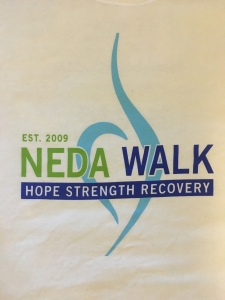
The National Eating Disorder Association (NEDA) is a “nonprofit organization dedicated to supporting individuals and families affected by eating disorders.” NEDA’s vision is a world without eating disorders, and their mission is to support and serve as a “catalyst for prevention, cures, and access to quality care.”
Every year, all throughout the country, NEDA hosts walks to raise money and awareness about eating disorders. NEDA walks are a great way for people with connections to eating disorders to seek support from a community of people who understand what it’s like, support those who need it, hear empowering messages from speakers, and be a part of something bigger.
On Sunday, September 30th, Goucher hosted the NEDA walk at the Dorsey Center. After getting a chance to check in, participants had time to meet other people at the event and talk to representatives of NEDA programs before a voice came through the speakers and announced Kara Richardson Whitely as the first speaker of the morning.
Kara is a motivational public speaker, an author, a mother, and she is in recovery from an eating disorder. In her speech, she shared how, as a part of her recovery, she’s climbed to extraordinary heights, both figuratively and literally, by climbing Mount Kilimanjaro three times.
The second speaker of the day was Andrew Walen. Andrew is an author, speaker, advocate, and certified eating disorder specialist with expertise in males with eating disorders. He joked about how he didn’t know what to say until five minutes before getting in front of everyone, but in his speech, he talked about his battle with an eating disorder, how he overcame it with the help of his wife and son, and he talked about all the amazing things he’s seen people do in recovery, which I saw as very impactful for men with eating disorders because, while eating disorders aren’t as common in men, around one-third of those with eating disorders are male.
After the speeches, the walk began. We gathered behind the NEDA banner and started to walk from the Dorsey Center, around the Loop Road, between Stimson and Heubeck, down Van Meter, and back to Dorsey. In the concluding announcements, three individuals and one team were identified and recognized for their fundraising contributions. After that, people started to dwindle away, and the walk ended.
One year ago, I sat in my P. Selz dorm on Goucher’s campus struggling with my own mental health. But this wasn’t something new to me. I have struggled with mental illness for my entire life. I won’t get into numbers, but I have been in a multi-year long battle with an eating disorder. A year ago, I wasn’t a person; I was the embodiment of my eating disorder pretending to be me.
Before I came to Goucher, I had an entire team of medical professionals telling me to not go to school and to go back into treatment instead, but I refused. I knew what I was getting myself into, but that’s the thing about being sick with an eating disorder: it can make you feel in control and like nothing can hurt you – until something does and you have to leave everything you love behind.
My eating disorder caused an avalanche of events that ruined my life, sending me to the ground in shambles. I didn’t know where to start picking up the pieces to attempt to tape them back into place, so I eventually got up and I went to treatment. And I pretended to be okay until I made it back to school. Then I crashed again, this time harder and faster and in a more devastating way than before. Only this time I didn’t get up. I didn’t even pretend. I was done fighting.
I was done until I, the real non-eating disorder me, asked myself to try one more time. I got myself into to treatment and instantly regretted it. I hated every minute of being there at first, but slowly my mind started to shift. Was this recovery? I wasn’t going to question it because it was forward momentum, real progress! I am standing here proud to say that while yes, my recovery is very little after time and time again of trying and failing, it’s enormous to me and my supporters.
The 2018 Baltimore NEDA Walk was my first walk where I was fully in recovery. It was both inspiring and empowering for me and my recovery. And I hope it is the same for others who are recovered, in recovery, finding recovery, and those who are supporters.
I know it’s hard to find hope and healing, but it is possible. If you’re struggling, reach out for support. Recovery IS possible. You are worth it and you are enough.
BY ANONYMOUS
